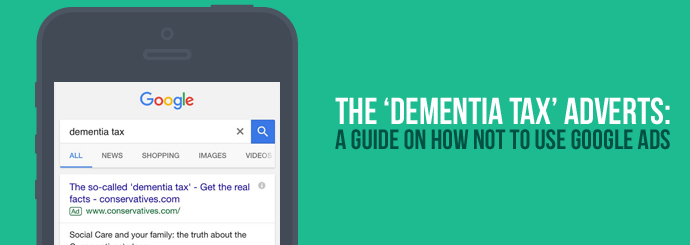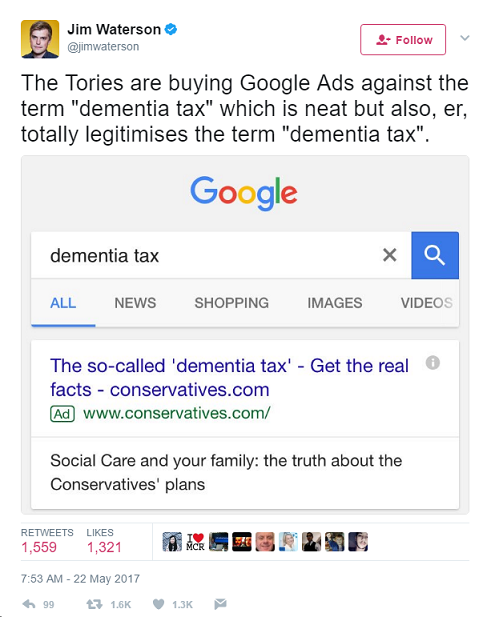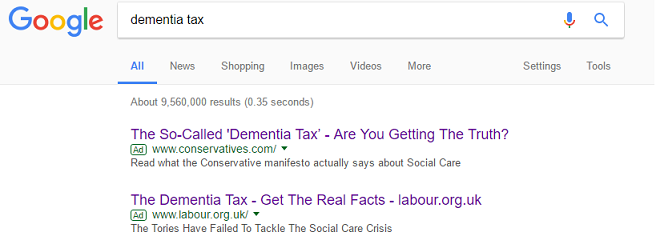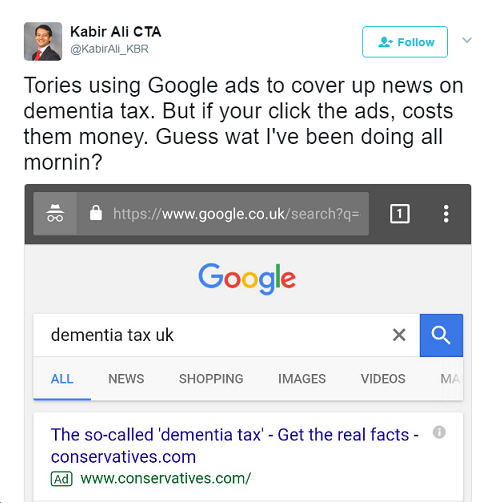
If you have been following the recent political campaigning for the snap election on June the 8th, you may have read about the recent criticism regarding the Conservatives ‘Dementia Tax’. This policy, which may require the elderly to pay for their care at home with the value of their house, has come under fire by opposing political parties and the public alike.
The policy coined the name ‘dementia tax’ due to the likely-hood it will be the sick and elderly who will face the brunt of this new policy. As many people would also like to leave their home to their families once they pass on, this proposal seems to have struck a chord with many British families.
In response to the negative press the Conservatives received for this policy, they decided to use Google Ads to advertise their own version of the policy under the title ‘The So-Called ‘Dementia Tax’ – Are You Getting the Truth?’ whenever someone googled the phrase ‘dementia tax’.
Here’s a look at why buying Google Ads for ‘Dementia Tax’ backfired on quite a big scale for the Conservatives.
-
Buying the adverts for ‘dementia tax’ legitimised the term Dementia Tax
Despite the general consensus, Dementia Tax is not the actual term for Theresa May’s policy. However, by buying the adverts for the ‘dementia tax’, the term has now become legitimised with around 448,000 exact match results on Google Search.
By legitimising the term, this also provided journalists with every right to run articles with the term ‘dementia tax’ which lead to an onslaught of articles criticising the Conservatives tactics.
A lesson to take away from this if you’re looking to use Google Ads for your business is to ensure you bid for the correct term and provide users with the exact thing they are searching for. The issue with the Conservatives advert was that if someone was searching for ‘dementia tax’, they most likely already knew about the negative press the term was receiving.

-
Google Ads are open to everyone, even your rivals
Soon after it was discovered that the Conservatives had bought a slot on the front page of the ‘dementia tax’ search, with their article ‘The So-Called ‘Dementia Tax’ – Are You Getting the Truth?’, the Labour Party also bought their own Google Ad for ‘dementia tax’. Their article named ‘The Dementia Tax – Get the Real Facts’ with a meta description ‘The Tories Have Failed to Tackle the Social Care Crisis’.
Not only did this article undermine the Conservatives article, it also made it clear to the public that these were bought adverts. Because it is an advert, it may lead the users to believe they will receive a skewed version of events by clicking on it.

-
Google Ads cost money per click
Traditionally, Google Ads are used by businesses that wish to advertise what they’re selling. This is because the sale of their products will even out the cost of the advert.
In the case of the ‘dementia tax’ Google Ad, the conservatives are not gaining any revenue through their Ad and are instead losing money advertising for this term because it is purely just information on the policy.
Another unintended effect of this campaign was that some Twitter users even proclaimed they would click on the ad only to lose the Conservatives money.

-
Google makes it clear that an advert is an advert
As can be seen in the pictures above, Google Ads come with a neat little ‘Ad’ box in light green next to the article. This makes it obvious to the user that this search engine result is an advert which has paid to be in the top position. Although it has been found that 64.6% of people click on Google Ads when they are looking to buy an item online, this may not work as well when the advert is for an article.
Many users will have a preference for their source of journalism, and so might bypass the Conservatives ‘dementia-tax’ Google Ad altogether. Advertising about policies is marginally more difficult than advertising a product, and the Conservatives lack of understanding in this department is what led to their downfall with this campaign.
After reading this list of how not to use Google Ads, if you did want some help with your own PPC Advertising our experts are here to help. To request a quote for help with PPC, just click here.